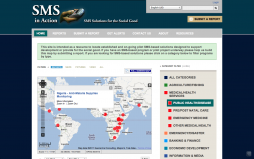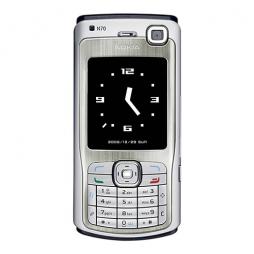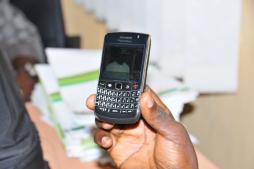apps
Posted by ccarlon on Sep 30, 2011
SMS in Action is an interactive crowdmap that allows users to submit and search for SMS-based systems that aim (or claim) to have a social impact. The map can be filtered by categories including Agriculture, Health, Emergency/Disaster Services, Banking, Economic Development, Information and Media, Education, and Governance with many of these categories dividing into further subcategories. Reports may also be filtered by report date.
Corresponding markers on the map can be clicked giving the user the option to zoom in/out or get more information. While clearly still in its early stages, the map has a lot to offer. A quick search for disease programs under medical/health returned over a dozen hits across the map. Additionally, users may subscribe to receive location-specific email alerts whenever a report is posted within 20 miles of a designated area.
Posted by AnneryanHeatwole on Sep 22, 2011
Today's Mobile Minute brings you coverage on a new mobile frequency breakthrough, comparisons between mobile devices and PCs, the results of a mobile-based South African youth sex survey, the growth of apps in the Asia-Pacific region, and a look at the future of the global mobile payment industry.
- Researchers at Rice University have developed a new technology that allows mobile devices to use the same frequency to both talk and listen to cell towers. Normally, two frequencies are needed to transmit and receive wireless data; the new technology could allow operators to double the capacity of their towers.
- A new study from the International Data Corporation predicts that mobile Internet users will outnumber PC Internet users by 2015. Read Write Web reports that although smartphones are a big part of the shift, the release of tablet devices like the iPad give the predictions of mobile-dominance more credence.
- The Praekelt Foundation recently released the results of its "Youth Sex Survey," which received more than 130,000 responses via the mobile platform Young Africa Live. The survey asked users of the social portal questions about their sexual health and opinions about sex and relationships; AudienceScapes reports on some of the responses: "Findings included a high percentage (44 percent) of South African youth admitting they are sexually active at the same time that they are significantly concerned about HIV/AIDS – 81 percent of respondents indicated they equate 'not telling a sexual partner that you carry the virus' with outright murder." (Read more about the Praekelt Foundation and Young Africa Live here.)
- Mobile applications are huge in the Asia-Pacific region; a study by the analyst firm Ovum estimates that "total number of mobile apps downloaded could reach 14 billion in 2016." TechCircle reports that the region already anticipates 5 billion app downloads for 2011, and that estimated revenue from paid mobile applications could reach $871 this year.
- If you like charts, check out this graphic depicting a prediction of the global mobile payments market (based off data from Juniper Research) by the year 2015. Divided into eight worldwide regions, the graph (and research) shows how the world will use mobile payments (including near field communications, mobile payments/transfers, and regular purchase of goods).
[Mobile Minute Disclaimer: The Mobile Minute is a quick round-up of interesting stories that have come across our RSS and Twitter feeds to keep you informed of the rapid pace of innovation. Read them and enjoy them, but know that we have not deeply investigated these news items. For more in-depth information about the ever-growing field of mobile tech for social change, check out our blog posts, white papers and research, how-tos, and case studies.]
Image courtesy Flickr user QiFei
Posted by MelissaLoudon on Jun 30, 2011
Smartphones (iPhone, Android, Blackberry, Windows Mobile, Symbian) and many feature phones allow you to download and install mobile applications (“apps”). Apps do many useful things. However, some apps (and other types of software, such as your mobile operating system) can also present security risks. These include:
Apps and other software may have access to information stored on or generated by your phone.
Apps and other software may have the ability to transmit this information using your phone’s Internet connection.
Malicious apps or other mobile software installed on your mobile device can expose you to the following risks:
Your conversations may be listened to or recorded without your knowledge.
Your text messages, emails and web traffic may be monitored and logged.
Data stored on your phone (contacts, calendar entries, photos and video) may be accessed or copied.
Passwords stored or entered on your phone may be stolen and used to access your online accounts.
Your locationmaybetracked, even when your phone is switched off.
With smartphones gaining market share, malicious apps are beginning to pose a serious threat. In an article titled “Your Apps Are Watching You”, the Wall Street Journal tested popular iPhone and Android apps, and found that of 101 apps tested, 56 transmitted a unique identifier for the phone without informing the user or asking for consent. 47 apps also transmitted the phone’s location, while 5 sent age, gender or other personal details to various companies. The App Genome Project reports that 28% of all apps in the Android Market and 34% of all free apps in the Apple App Store have the capability to access location, while 7.5% of Android Market apps and 11% of Apple App Store apps have the capability to access users’ contacts.
It can be very difficult to tell which apps are safe and which are not. App behaviours that might not bother most users, such as transmitting the phone’s location to an advertising server, can be unacceptable to people with higher privacy and security requirements.
This article offers suggestions on how to assess risks to security and privacy posed by apps.
Posted by AnneryanHeatwole on Aug 18, 2010
Today's Mobile Minute brings you coverage on the debate between native apps and web apps, an Android application that uses Spyware to mine GPS data, questions about how to define "mobile" devices, an infographic that details texting habits in the US and around the world, and a controversy over a mobile water-finding app for people crossing the Mexico/US border.
Posted by AnneryanHeatwole on Jul 16, 2010
The Mobile Minute, our new feature, is here to keep you up-to-date on mobile-related news. Today's stories are about the number of Google searches made on mobile phones, an updated version of the PDA survey kit, the relationship between ICTs and accountable governments, and an octopus-themed mobile app.
- "Mobile Accounts for 10% of Google Searches, Says Analyst" This Read, Write, Web article looks at comScore search market data – and found that mobile phones are used to make more than 1 billion monthly Google searches in the U.S.
- "WFP PDASurvey" The World Food Program released an updated version of its PDA-based data collection tool. The group says that the program "allows very large questionnaires to be built very rapidly and deployed onto many PDAs using flash memory cards."
- "Full Circle: ANSA-Africa Newsletter" The latest ANSA-Africa Newsletter looks at government accountability and the role ICTs can play in giving citizens a means of expression. Other topics include local government social media and responsibility, ICTs in Kenya, and creating connections in Bangladesh. (via Accountability 2.0)
- "Paul the Psychic Octopus Gets an App" If you find yourself without psychic guidance now that Paul the Octopus (who gained fame by correctly predicting all of Germany's World Cup matches, as well as the final) has retired, a new iPhone app called "Ask the Octopus Oracle" can fill the void.
[Mobile Minute Disclaimer: The Mobile Minute is a quick round-up of interesting stories that have come across our RSS and Twitter feeds to keep you informed of the rapid pace of innovation. Read them and enjoy them, but know that we have not deeply investigated these news items. For more in-depth information about the ever-growing field of mobile tech for social change, check out our blog-posts, white papers and research, how-tos, and case studies.]
Image courtesy Flickr user QiFei



